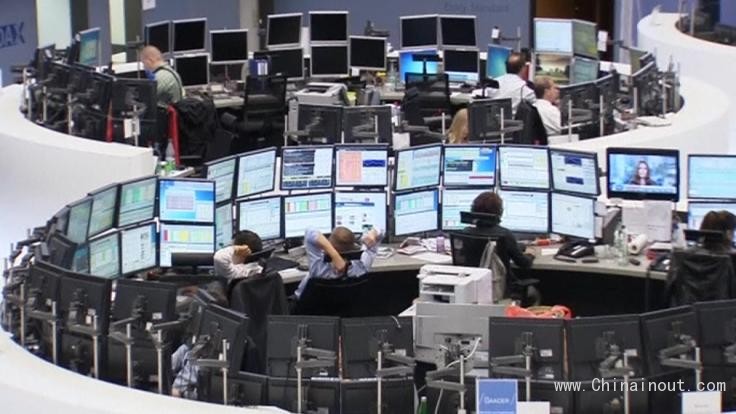
毫無(wú)疑問(wèn),,當(dāng)前美國(guó)經(jīng)濟(jì)局面要比大洋對(duì)面的歐洲更為樂(lè)觀(guān),。
1.國(guó)內(nèi)生產(chǎn)總值
18個(gè)國(guó)家使用歐元作為貨幣的歐元區(qū),公布的第二季度GDP增長(zhǎng)0%,。而之前第一季度增長(zhǎng)為0.2%。美國(guó)經(jīng)濟(jì)第一季度情況比較糟糕,,下降了2.1%,。但緊隨其后的是第二季度強(qiáng)勁增長(zhǎng)4%,并且很多證據(jù)表明其經(jīng)濟(jì)走強(qiáng)的趨勢(shì),而不是走弱。(更多全球資訊瀏覽中國(guó)進(jìn)出口網(wǎng))
2失業(yè)率
美國(guó)失業(yè)率是6.2%,,而在歐元區(qū)為11.5%,,其中希臘為27.2%,西班牙為24.5%,處于經(jīng)濟(jì)衰退所造成的高失業(yè)的困境。這些國(guó)家的青年失業(yè)率高于50%,,而在美國(guó)是13%左右,。眾所周知,,通常在歐洲解雇員工很件難事, 這意味著如果在美國(guó)裁員很常見(jiàn)的話(huà),歐元區(qū)的這個(gè)比率會(huì)更高,。
3通貨膨脹
在美國(guó),通貨膨脹大約2%,企業(yè)通過(guò)給工人獲得加薪,讓他們提前應(yīng)對(duì)小幅的價(jià)格上漲,。在歐洲通貨膨脹率是0.4%,,接近通貨緊縮——通常是比通貨膨脹更為糟糕。經(jīng)濟(jì)通貨緊縮,未來(lái)的貨幣將大大貶值,,債務(wù)成本隨著時(shí)間的推移越來(lái)越高,。

4央行刺激
美國(guó)聯(lián)邦儲(chǔ)備理事會(huì)(美聯(lián)儲(chǔ),fed)結(jié)束量化寬松政策,明年可能會(huì)開(kāi)始提高利率,減少對(duì)經(jīng)濟(jì)的負(fù)面影響。這就是隨著經(jīng)濟(jì)的升溫美聯(lián)儲(chǔ)應(yīng)對(duì)策略,。相比之下,歐洲中央銀行仍在考慮是否應(yīng)該開(kāi)始量化寬松政策,,歐洲似乎再次被美國(guó)落下。
5股票
今年迄今為止美國(guó)道瓊斯工業(yè)股票平均價(jià)格指數(shù)和歐洲差距不大,。但在過(guò)去的五年中美國(guó)道瓊斯工業(yè)指數(shù)的飆升了79%,而道瓊斯歐洲僅上升25%,。差距表明在美國(guó)聯(lián)邦儲(chǔ)備理事會(huì)(美聯(lián)儲(chǔ),fed)的高度寬松的貨幣政策刺激下,美國(guó)經(jīng)濟(jì)更為強(qiáng)大并且經(jīng)濟(jì)已經(jīng)開(kāi)始復(fù)蘇,。
6 銀行
美國(guó)銀行業(yè)在經(jīng)歷了2008年金融危機(jī),TARP救助和一系列新規(guī)訴訟后幾乎已恢復(fù)健康運(yùn)作水平,。然而,歐洲仍然忙著處理銀行倒閉和救助,比如最近在葡萄牙圣埃斯皮里圖銀行的倒閉,歐洲銀行仍解除風(fēng)險(xiǎn)價(jià)值數(shù)十億歐元的債務(wù),。結(jié)果是在美國(guó)信用經(jīng)濟(jì)命脈正在慢慢回到正常,而歐洲卻遠(yuǎn)遠(yuǎn)落后,。

7地緣政治壓力
烏克蘭的沖突幾乎沒(méi)有觸動(dòng)美國(guó)經(jīng)濟(jì),但它已經(jīng)刺痛了歐洲,而且情況似乎可能會(huì)惡化。“俄羅斯的金融制裁,軍事和能源產(chǎn)業(yè)最終會(huì)影響歐盟的工業(yè)生產(chǎn),”Moody的分析最近寫(xiě)道,。俄羅斯的歐洲食品進(jìn)口禁令將迫使許多農(nóng)民另尋銷(xiāo)路,而其他市場(chǎng)可能在歐洲出售更多產(chǎn)品,這將推動(dòng)價(jià)格下降和惡化通貨緊縮風(fēng)險(xiǎn),。如果莫斯科決定削減能源出口,歐洲將會(huì)處于不得不尋找其他天然氣和石油來(lái)源的局面,而美國(guó)由于繁榮的國(guó)內(nèi)鉆井而不受影響,。
對(duì)歐洲人來(lái)說(shuō)他們對(duì)美國(guó)有很多合理的抱怨:美國(guó)的國(guó)會(huì)形同小丑,槍支到處都是,醫(yī)療保障不健全······ 然而從經(jīng)濟(jì)層面來(lái)說(shuō)美國(guó)現(xiàn)在比歐洲形勢(shì)要好,。
7 ways the U.S. economy is trouncing Europe’s
We’ve got problems. There’s no doubt about that. But America seems like a breakout economy compared with the woes our European counterparts are dealing with.
1.GDP
The euro zone, which comprises the 18 countries that use the euro as their currency, just reported GDP growth of 0% for the second quarter. That comes after 0.2% growth in the first quarter. The U.S. economy had a terrible first quarter, too, with output falling by 2.1%. But that was followed by robust second-quarter growth of 4% and lots of other evidence of an economy getting stronger, not weaker.
2.Unemployment.
The U.S. unemployment rate is 6.2%. In the euro zone, it’s 11.5%. Greece, at 27.2%, and Spain, at 24.5%, suffer from depression-level unemployment. Youth unemployment in these countries has been higher than 50% in 2014; in the U.S. , it hovers around 13%. Keep in mind, it’s generally harder to fire workers in Europe, which means the euro zone rates might be higher still if U.S. -style layoffs were common there.
3 Inflation
In the United States, it’s about 2%, which is close to the sweet spot that allows workers to earn raises that keep them ahead of modest increases in prices (though that’s not happening yet). In Europe, inflation is 0.4%, which is dangerously close to deflation -- which is usually worse than inflation. In an economy with deflation, future money is worth less, which means debt costs more and more to pay off over time. And people often put off purchases when they believe prices will fall, which can torpedo growth and hiring.
4Central-bank stimulus
The Federal Reserve is winding down the extraordinary policy known as quantitative easing, and by next year will probably begin to raise interest rates, barring any shocks to the economy. That’s what the Fed is supposed to do as the economy heats up. The European Central Bank, by contrast, is still considering whether it should begin quantitative easing, which the Fed kicked off in 2008. Again, Europe seems years behind the United States.

5 Stocks.
The Dow Jones Industrial Average and its European counterpart, the Dow Europe, are both within a few points of flat so far this year. But during the past five years, the DJIA has soared by 79% while the Dow Europe has ticked up just 25%. That performance gap reflects the much stronger U.S. economy and the head start America has on recovery, along with the Federal Reserve's highly accommodative monetary policy.
6 Banks
The U.S. banking sector is nearly healthy again, after the excesses of the early 2000s led to the 2008 financial meltdown, the extraordinary TARP bailouts and a slew of lawsuits and new regulations. Europe, however, is still dealing with bank failures and bailouts, such as the recent collapse of Banco Espirito Santo in Portugal. And European lenders are still unwinding billions of euros’ worth of risky debt. The upshot is that credit — the lifeblood of the economy — is slowly getting back to normal in the United States, while Europe lags far behind.
7 Geopolitical pressure
The conflict in Ukraine barely touches the U.S. economy, but it’s already causing pain in Europe, and this seems likely to worsen. “Sanctions targeting Russia’s financial, military and energy industries will eventually take a toll on European unio industrial production,” Moody’s Analytics wrote recently. A Russian ban on European food imports will force many farmers to find other markets for their food, possibly selling more in Europe, which would drive prices down and worsen the risk of deflation. And Europe stands to suffer if Moscow decides to curtail energy shipments, since it would have to find other sources of gas and oil — a problem the United States no longer has, thanks to a boom in domestic drilling.
(更多全球資訊瀏覽中國(guó)進(jìn)出口網(wǎng))
Europeans, for their part, have plenty of legitimate gripes with America: We have a clown Congress, guns are everywher, and more Americans have TVs than healthcare. Economically, however, America remains a much better place to be right now.











